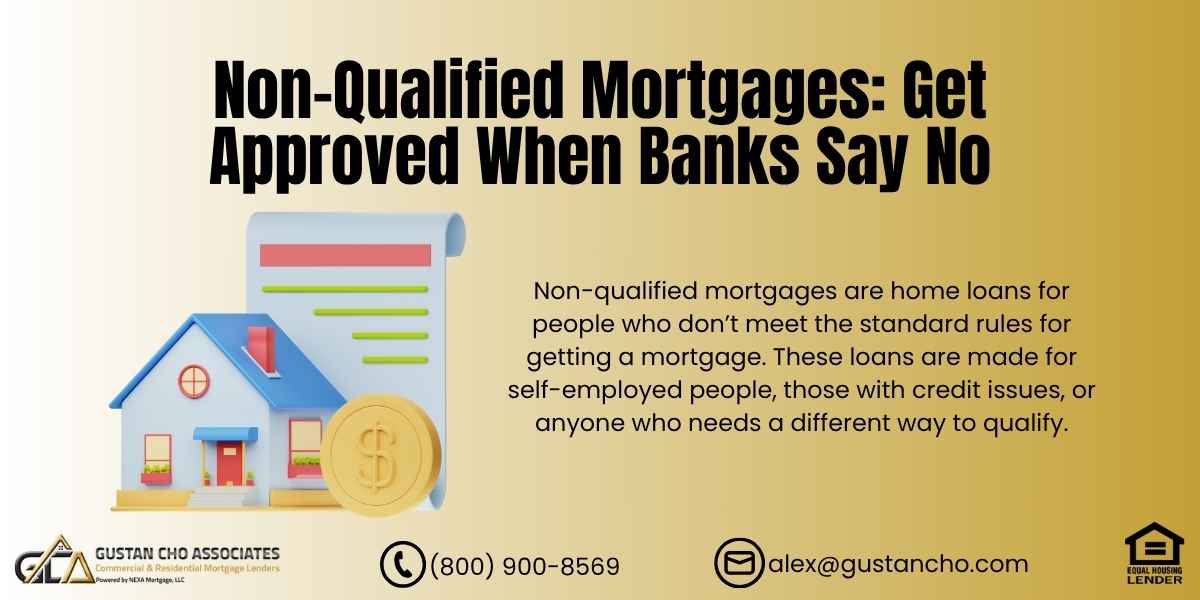Non-Qualified Mortgages: 2025 Guide to Flexible Home Loans When Banks Say No
Are you self-employed, have credit challenges, or have recently filed for bankruptcy or foreclosure? If you’ve been told “no” by traditional lenders, it’s time to look into non-qualified mortgages. These are flexible loan options designed for people who don’t fit inside the standard mortgage box.
At Gustan Cho Associates, we help borrowers get approved for home loans even when other lenders say no. In this 2025 guide, we’ll walk you through everything you need to know about non-qualified mortgages, how they work, and how to get approved.
What Are Non-Qualified Mortgages?
Non-qualified mortgages, or non-QM loans, are home loans made for borrowers who don’t meet the strict rules of conventional, FHA, VA, or USDA loans. Unlike traditional mortgages, non-QM loans are not backed by the government or Fannie Mae/Freddie Mac. That gives lenders more flexibility to help people in unique situations.
Who Are Non-Qualified Mortgages For?
Non-qualified mortgages, or non-QM loans, can help many different types of people get a home. They are great for self-employed workers who may not have a steady income or for gig workers and independent contractors with flexible jobs.
These loans can also help people with high debt compared to their income or those who have just come out of bankruptcy or foreclosure. Real estate investors and house flippers can also benefit from non-qualified mortgages and foreign nationals who do not have a U.S. credit score.
Lastly, people who write off a lot of income on their tax returns might find these loans helpful. If you see yourself in any of these groups, non-qualified mortgages could be the right choice for you to buy or refinance your home.
Looking for More Flexible Mortgage Options? Explore Non-QM Loans Today!
Contact us today to learn more about how we can help you secure financing.
Why Do Borrowers Choose Non-QM Loans?
Many borrowers use non-qualified mortgages because they need:
- Faster closings
- Flexible credit requirements
- Alternative ways to verify income (like bank statements)
- Financing for unique properties (like condotels or homes with acreage)
- Investment property loans with no income verification (DSCR loans)
- Could not qualify for government or conventional loans due to having one or more mortgage late payments in the past twelve months.
These loans are a lifeline for people who can afford a home but don’t want to deal with the paperwork required by traditional mortgages.
Most Popular Non-Qualified Mortgage Options
Here are the top non-QM loan programs available in 2025:
Bank Statement Loans
Bank statement loans help people get a mortgage by using 12 to 24 months of their personal or business bank statements instead of traditional tax returns. This is especially helpful for self-employed people or those with irregular income who can show their cash flow through their bank activity.
DSCR Loans (Debt-Service Coverage Ratio)
DSCR loans make it easier for real estate investors to get financing since they focus more on the property’s rental income than the borrower’s personal income. This means investors can more easily secure loans for their rental properties if the rent covers the loan payments.
Foreign National Loans
These loans cater specifically to non-U.S. citizens looking to purchase property in the United States. They often do not require U.S. credit history, making it an accessible financing option for foreign investors wanting to tap into the American real estate market.
No-Doc or Low-Doc Loans
No-doc or low-doc loans do not require standard documents such as tax returns or W-2 forms. Instead, they depend entirely on the borrower’s assets or bank statements, making them suitable for individuals who might lack traditional income verification.
Asset Depletion Loans
Asset depletion loans let people use their retirement savings or other assets to create a monthly income that counts for qualifying. This option helps retirees or those with significant savings who do not have regular income but want to get a mortgage.
P&L Only Loans
P&L only loans utilize a Profit and Loss statement from a certified public accountant (CPA) instead of standard income verification. This alternative is advantageous for self-employed individuals or business owners who can substantiate their income through comprehensive financial documentation without relying on traditional employment records.
All these options fall under the umbrella of non-qualified mortgages.
How Non-QM Loans Are Different From Traditional Loans
| Feature | Traditional Loans | Non-Qualified Mortgages |
| Credit Score | 620+ minimum | No official minimum |
| Income | Must be fully documented | Bank statements or P&L accepted |
| Waiting Period | 2-7 years after BK or FC | As little as 1 day out of BK/FC |
| Loan Type | Agency-backed (FHA, VA, Fannie) | Private lender programs |
| Property Type | Must meet agency rules | Flexible property types (condotels, non-warrantable condos) |
This flexibility is why non-qualified mortgages are a smart option for people with non-traditional financial profiles.
Do All Non-QM Lenders Have the Same Rules?
No—each non-QM lender has different guidelines. Some require three credit tradelines; others don’t. Some will approve 90% loan-to-value (LTV) loans, others only 70%.
At Gustan Cho Associates, we work with over 210 wholesale non-QM lenders, giving you access to hundreds of unique loan programs. That means if one lender says no, another may say yes.
How Are Rates and Down Payments Set?
Non-qualified mortgages, or Non-QM loans, work differently than regular loans because they focus on how risky it is to lend money. Usually, if you have a higher credit score, you get a lower interest rate and can pay a smaller amount as a down payment, around 10-15%. However, if your credit score is lower or you have had a recent credit problem, like bankruptcy or foreclosure, you may face a higher interest rate and need to pay more money upfront, about 30-40%.
Overall, the rates for non-qualified mortgages are usually 1-3% higher than regular mortgages. But this extra flexibility can be very helpful for people who may not meet the strict requirements of traditional loans.
Can Lenders Make Exceptions?
Yes! That’s what makes non-qualified mortgages so powerful. Let’s say you’re applying for a non-QM jumbo loan that asks for three tradelines, but you only have two. The lender may approve you if you have strong credit, large reserves, or a low loan-to-value.
Every file is manually reviewed, so strong compensating factors (like savings or job history) can get you approved.
Real-World Examples
Case Study 1: Self-Employed Contractor
A self-employed contractor found it hard to get a regular loan because their income was low. To solve this, they chose a 12-month bank statement loan. This helped them buy a $500,000 house with a 15% down payment.
Case Study 2: Investor with Multiple Properties
In a different case, an investor with several properties wanted to avoid using personal income to get financing. They solved this using a DSCR loan, which checks if rental income is enough to cover loan payments. The investor successfully closed the deal in just 21 days.
Case Study 3: Just Out of Bankruptcy
Additionally, there was a case of an individual who had recently emerged from bankruptcy and was denied a loan by a traditional bank due to a bankruptcy that was only a year old. However, they found a solution with a non-QM (Qualified Mortgage) loan requiring a 30% down payment, and they were approved within 48 hours of submission. These case studies highlight how alternative lending solutions can effectively meet diverse financial needs.
Unique Properties That Qualify for Non-QM Loans
Traditional mortgages have strict rules about the types of homes you can finance. Non-QM lenders are more flexible.
You can get non-qualified mortgages for:
- Homes on large acreage
- Non-warrantable condos
- Mixed-use or commercial/residential properties
- Hobby farms
- Condotels (condo + hotel units)
- New construction homes
How to Apply for a Non-Qualified Mortgage
At Gustan Cho Associates, we make applying easy:
- Call or contact us online
- Speak with a licensed loan officer to discuss your needs.
- We match you with a lender that fits your situation
- Submit basic paperwork (like bank statements or P&L)
- Get pre-approved and close in as little as 2-3 weeks
Whether buying a home, investing in real estate, or refinancing, we’ll help you every step of the way.
Need a Loan That Fits Your Unique Situation? Consider Non-QM Mortgages!
Non-QM loans offer flexibility for borrowers with unique financial situations, like self-employment or non-traditional income. Reach out now to find out how you can qualify.
Why Work With Gustan Cho Associates?
- Licensed in 52 states
- Access to 210+ wholesale lenders
- Experts in non-qualified mortgages
- Fast closings, flexible guidelines, and high approval rates
We specialize in helping borrowers who’ve been turned away elsewhere. Our team understands the full range of non-QM programs and will fight to get you approved.
Ready to Get Started?
If traditional lenders say no, don’t give up. At Gustan Cho Associates, we specialize in getting borrowers approved for non-qualified mortgages that fit their unique financial stories.
Borrowers who need a five-star national mortgage company licensed in 52 states with no overlays and who are experts on non-QM loans, please contact us at 800-900-8569, text us for a faster response, or email us at alex@gustancho.com.
Frequently Asked Questions About Non-Qualified Mortgages:
Q: What are Non-Qualified Mortgages?
A: Non-qualified mortgages are home loans for people who don’t meet the standard rules for getting a mortgage. These loans are made for self-employed people, those with credit issues, or anyone who needs a different way to qualify.
Q: Who Should Consider Non-Qualified Mortgages?
A: If you’re self-employed, have a lot of write-offs on your taxes, just got out of bankruptcy, or were told “no” by a regular bank, non-qualified mortgages might be right for you.
Q: Can I Get Approved for Non-Qualified Mortgages with Bad Credit?
A: Yes! Many non-qualified mortgage lenders work with people with low credit scores or recent credit problems, like late payments or foreclosure.
Q: What Types of Non-Qualified Mortgages are Available in 2025?
A: Some common types include bank statement loans, DSCR loans for investors, no-doc loans, asset depletion loans, and loans for foreign nationals. All of these fall under non-qualified mortgages.
Q: Are Non-Qualified Mortgages More Expensive?
A: Usually, yes. Non-qualified mortgages often have higher rates and bigger down payments compared to regular loans, but they give you more flexibility to qualify.
Q: How Much do I Need for a Down Payment on a Non-Qualified Mortgage?
A: It depends on your situation. Some borrowers may only need 10-15% down, while others, if they have recent credit issues, may need 30-40%.
Q: Can I Use Non-Qualified Mortgages to Buy an Investment Property?
A: Yes. Non-qualified mortgages are great for real estate investors and people buying second homes or rental properties, especially with DSCR loans that use rental income to qualify.
Q: Can I Get a Non-Qualified Mortgage if I Just had a Bankruptcy?
A: Yes. Some non-qualified mortgage programs will approve you as soon as one day after bankruptcy or foreclosure, as long as you have a strong down payment or other strengths.
Q: What Kinds of Homes Can I Buy with Non-Qualified Mortgages?
A: These loans work for all kinds of unique homes, such as condos that don’t meet normal rules, homes on large land, condotels, or mixed-use properties.
Q: How do I Apply for a Non-Qualified Mortgage?
A: At Gustan Cho Associates, it’s simple. Contact us, talk to a loan officer, and send in your documents, and we’ll help match you with the best non-qualified mortgage.
This blog about the waiting period after foreclosure requirements for borrowers on title but not on mortgage was updated on May 27th, 2025.
Take First Step Toward Making Your Dream A Reality
Apply Now And Get recommendations From Loan Experts




